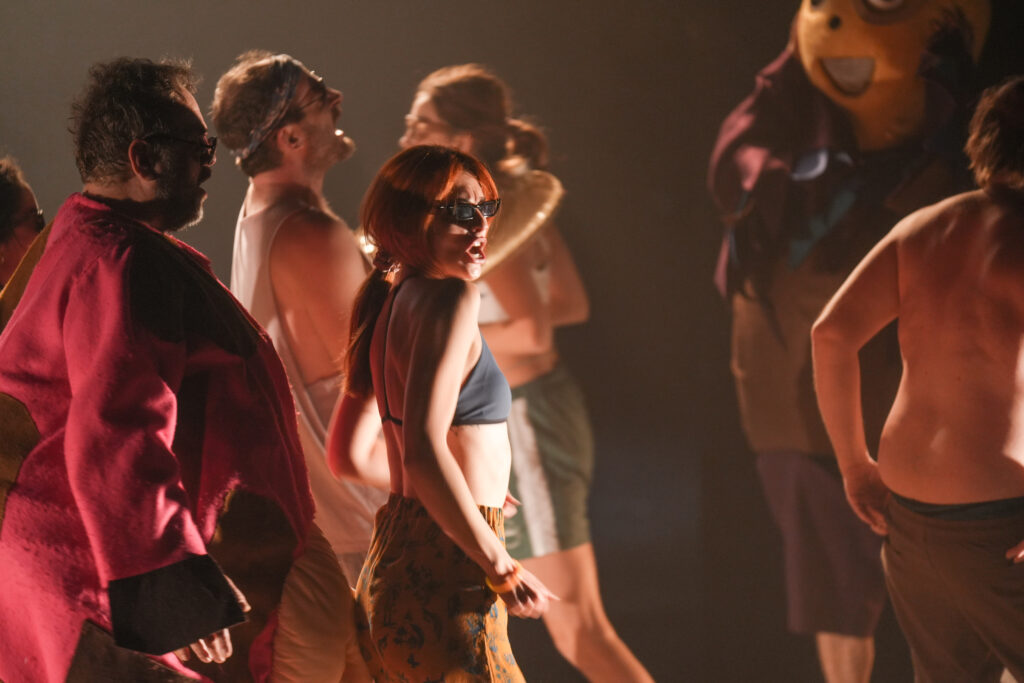Belgrade Drama Theatre, premiere 15th December 2023
Kim Stanley Robinson’s 2020 novel The Ministry of The Future, part of the growing sci-fi subgenre of climate fiction, provided the inspiration for the last show of the 2023 Belgrade Drama Theatre season. A co-production with Slovenian theatre Mesno Gledališče Ljubljana, it was directed by Žiga Divjak. whose politically engaged work often touches on the topic of ecology.
Judging by his past work climate change and environmental issues are very important to Divjak. His production of Duncan Macmillan’s Lungs for SNG Drama Ljubljana featured a melting block of ice, and his shows Fever (Slovensko Mladinsko Gledališče),and Crises which premiered as part of the 56th Bitef festival also explored these topics.
In The Future, the stage is covered in sand. The actors from BDP and MGL play tourists on the beach. They depict different situations and behaviours that all connect with and illustrate the topic of climate change. This dystopian scenario is portrayed purely through the language of theatre and through dramatic actions as there is no spoken dialogue. (Perhaps inevitably the use of real sand in the scenography brings to mind Sun and Sea, the Lithuanian climate change opera by Rugilė Barzdžiukaitė, Vaiva Grainytė and Lina Lapelytė that Belgrade audiences had a chance to see at this year’s Bitef festival).
The show consists of a number of scenes. In an early scene, a couple arrives on the beach among single people and lay down together on a towel. This triggers anxiety in all the other tourists, so they begin to pair up themselves and lay in all manner of combinations with all the other people until all of them end up on a pile of bodies, all fighting to take the place of the other. They look almost like an amorphous object, like an amoeba, fighting for survival, or like a colony of bacteria reproducing itself. What started as an image of love and a human connection – a pair lying together on a beach – ended as a dystopian post-human image of the consequences of fear of missing out and greed.
Images like this one continue throughout the show: we see the tourists struggling with heat, calling their children on the beach, dancing in animal costumes while the popular 2000s song Macarena plays loudly in the background (twice).
The show’s best qualities are its use of humour, and the performance of the actors. But even though they often start humorously, almost every scene ends up tragically. The parents who call their children on the beach are funny at first, reminding us of annoying tourists who destroy the relaxing sound of the waves on a sunny afternoon, waving sandwiches and inflatables around. Yet, when their children don’t answer, we feel the tragedy of a parent who has lost their child. (A scene like this one feels especially powerful in Belgrade, where so many parents lost children in the shooting in Primary School Ribnikar this May). However, this would still be powerful even without knowledge of this context. The image of our children not answering us is a clear sign that we have lost our future.

The Future – Belgrade Drama Theatre. Photo: Dragana Udovicic
The scene actors in animal costumes (designed by Tina Pavlović) dance to the Macarena is also very humorous. However, the Macarena song doesn’t stop. It keeps playing and gets harder to listen to. Once again the scene becomes darker, as a soldier comes on stage in his uniform and starts dancing with clear PTSD symptoms on his face.
The only time we hear the actors speak is when they are calling the names of their children on the beach, and even then this is not dialogue as such.
Yet, there is text. Surtitles are projected in the intermezzos between the scenes – while the worker on the beach is levelling the sand. These surtitles have a documentary function, since they give information about ecology, about the production of plastics – a slow violence that is slowly but surely killing the Earth, since it gets produced more and more and all the plastic that has ever been produced is still with us.
Other than the documentary function, there is also a poetic function in these titles, probably which presumably originate from the novel The Ministry of the Future, translated by Sašo Puljarević, with the dramaturgy of Gregor Zorc.
The surtitles speak about the species of albatross that is in danger of extinction. While the story about the albatross species is told, a worker (Milan Zarić), wearing the T-shirt with an albatross, is seen cleaning the beach. Perhaps this sign represents a statement that the working class, as well as the albatross, is in danger, and if we want to go a step further – we can remember the famous song by Charles Baudelaire – The Albatross, which marked the beginning of modernism in poetry.
Often, to amuse themselves, the men of a crew
Catch albatrosses, those vast sea birds
[…]
The poet resembles this prince of cloud and sky
Who frequents the tempest and laughs at the bowman;
When exiled on the earth, the butt of hoots and jeers,
His giant wings prevent him from walking.
In this song, Baudelaire compares the albatross and the artist. The theatre artists, as well as poets, have visions of the future, and as Divjak states in the last scene of this show, where the tourists wait for the boat that never comes and the surtitles say simply “The Future“ – there is no future, not if we continue living and producing as we are.
The men of the crew mock the albatross, and we all know how much they mock ecology activists. As well as the albatross, artists and activists who critique and challenge capitalism are in danger of extinction if they continue to be met with very bad working conditions in precarious work (perhaps this is even a reason why this show hasn’t reached its full potential).
While there is quality in its use of humour, in its symbolic gestures, and in the way it evokes guilt, worry, and responsibility in the audience – at almost two hours at the performance I saw, it could be a bit shorter.
This show does succeed in exploring its themes without a word. This makes it equally accessible for both Serbian and Slovenian audiences and, for that matter, for the audiences of the whole world.
Yet, what Divjak’s piece lacks is the specific details that make a story unique and memorable. Even though this is a topic for the importance for the whole planet, as the old advice says: the more specific the story is, the more universal the message, as the American writer Richard Price puts it “the bigger the issue, the smaller you write. You don’t write about the horrors of war. You write about a kid’s burnt socks lying on the road.”
A more personal approach to the topic of ecology would, I think, have made for a more memorable show. Hopefully in Divjak’s future, he will consider other possibilities of approach to this topic.
Credits:
Director: Žiga Divjak//Translation: Sašo Puljarević//Dramaturg: Gregor Zorc//Scenography: Igor Vasiljev//Costume: Tina Pavlović//Composer: Blaž Gracar//Lighting: Borut Bučinel
For tickets and more information, visit: BDP.rs
Further reading: interview with Žiga Divjak: “We have to completely change our value system”
Further reading: review of Crises
Mina Milošević is a playwright, dramaturg, screenwriter, and theoretician based in Belgrade. She holds a BA in Dramaturgy and an MA in Theory of Drama Arts at the Faculty of Dramatic Arts in Belgrade. She worked as a dramaturg on plays in Atelje 212, Belgrade Drama Theatre, Yugoslav Drama Theatre, National Theatre in Belgrade, and Oda Theatre in Prishtina. Her play "Dr Ausländer (Made for Germany)" was presented at BITEF festival 2022. Her master's thesis on female friendship in Serbian contemporary theatre won the "Professor Boško Milin" Award.








